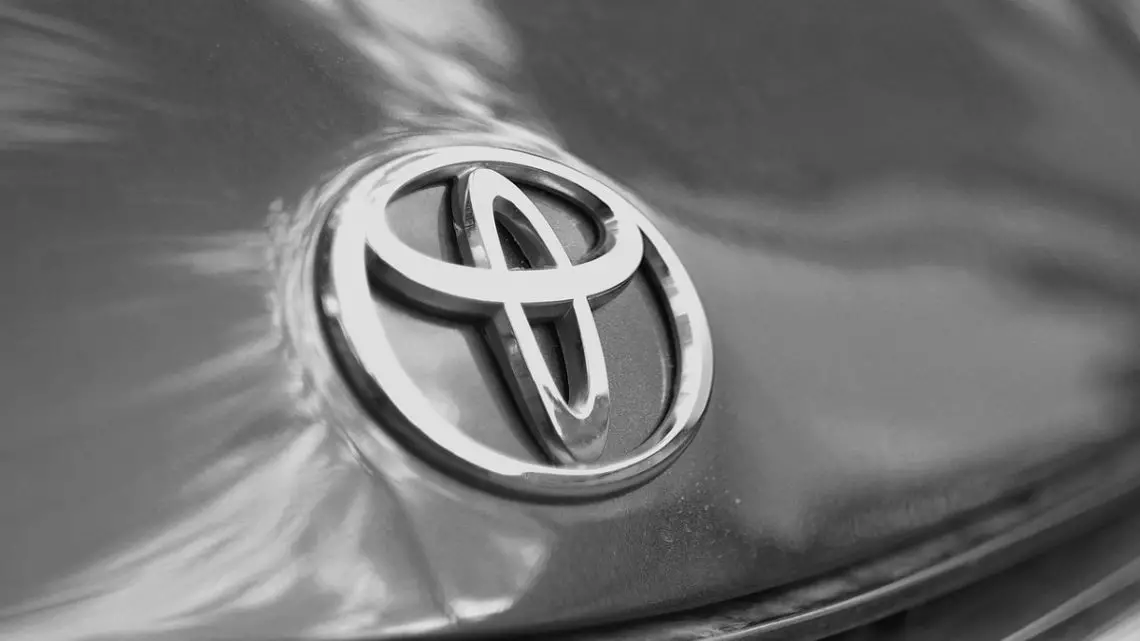
What makes Toyota’s hydrogen combustion engine special?
January 5, 2023The automaker has already rolled out a fuel cell car, but now it’s also working on using H2 in a new way.
Toyota has been developing a new vehicle with a hydrogen combustion engine, taking a new direction using H2 aside from its Mirai which is powered by a fuel cell.
The Japanese automaker is aiming to use H2 to its fullest and some suspect this could leave EVs behind.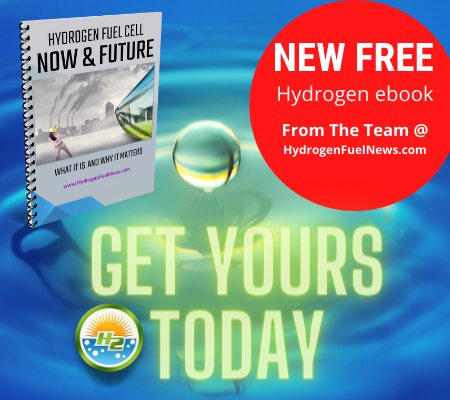
With the hydrogen combustion engine, Toyota is working on a new branch in its diversified carbon neutrality approach. Though the automaker began cutting down on fossil fuel powered vehicles starting in 1997, when it first rolled out its Prius, the automaker hasn’t put all its eggs in the all-electric basket. Moreover, the first fully battery electric vehicle (EV) it did release, the BZ4X, sold only a few hundred units (by October 2022), and the company doesn’t intend to boost its production of that vehicle until 2025.
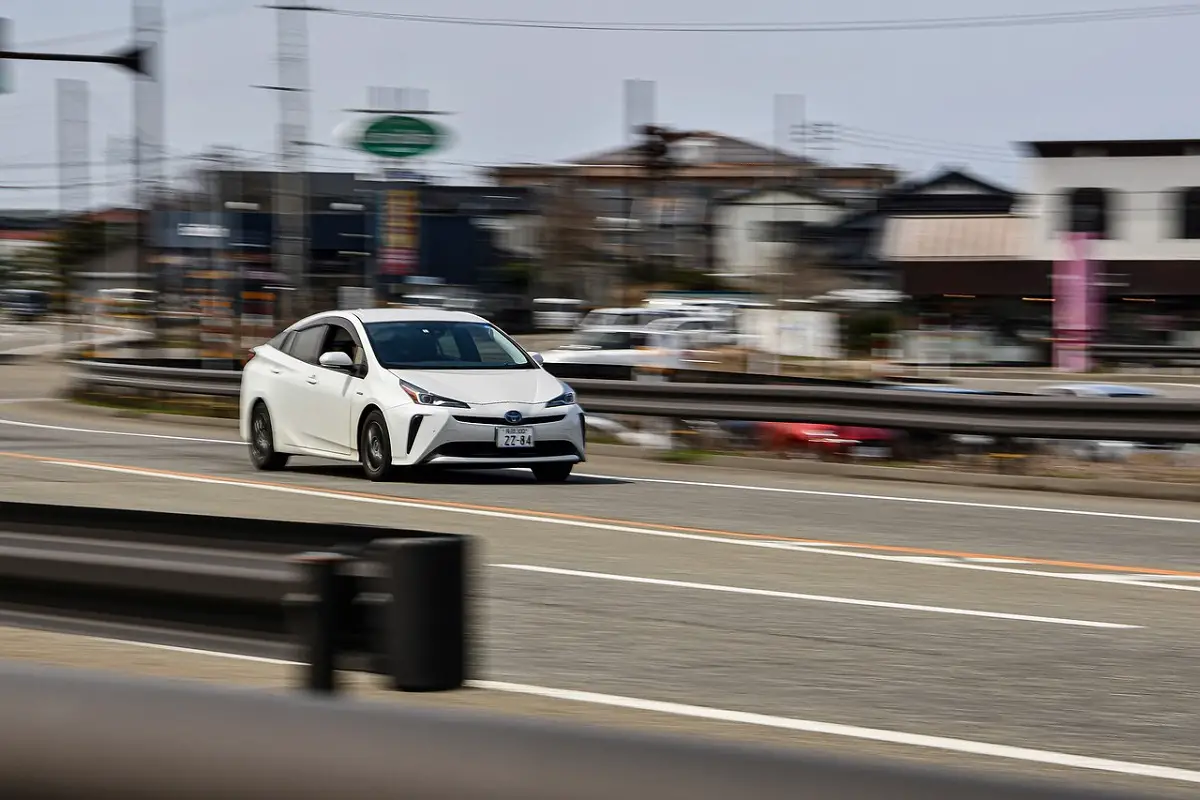
“People involved in the auto industry are largely a silent majority,” said Toyota president Akio Toyoda. “That silent majority is wondering whether EVs are really OK to have as a single option. But they think it’s the trend so they can’t speak out loudly. Because the right answer is still unclear, we shouldn’t limit ourselves to just one option.”
While battery electrics have certainly outsold H2 cars by a wide margin, according to JD Power, those vehicles still represent a small fraction of the total new car market.
Toyota recently unveiled its Corolla Cross H2 hydrogen combustion engine concept vehicle.
While the Mirai fuel cell electric vehicle has experience a slow roll-out to limited adoption – for a spectrum of reasons – Toyota’s prototype for an H2 internal combustion engine (ICE) in the form of the Corolla Cross H2 Concept opens up a new category for these cars.
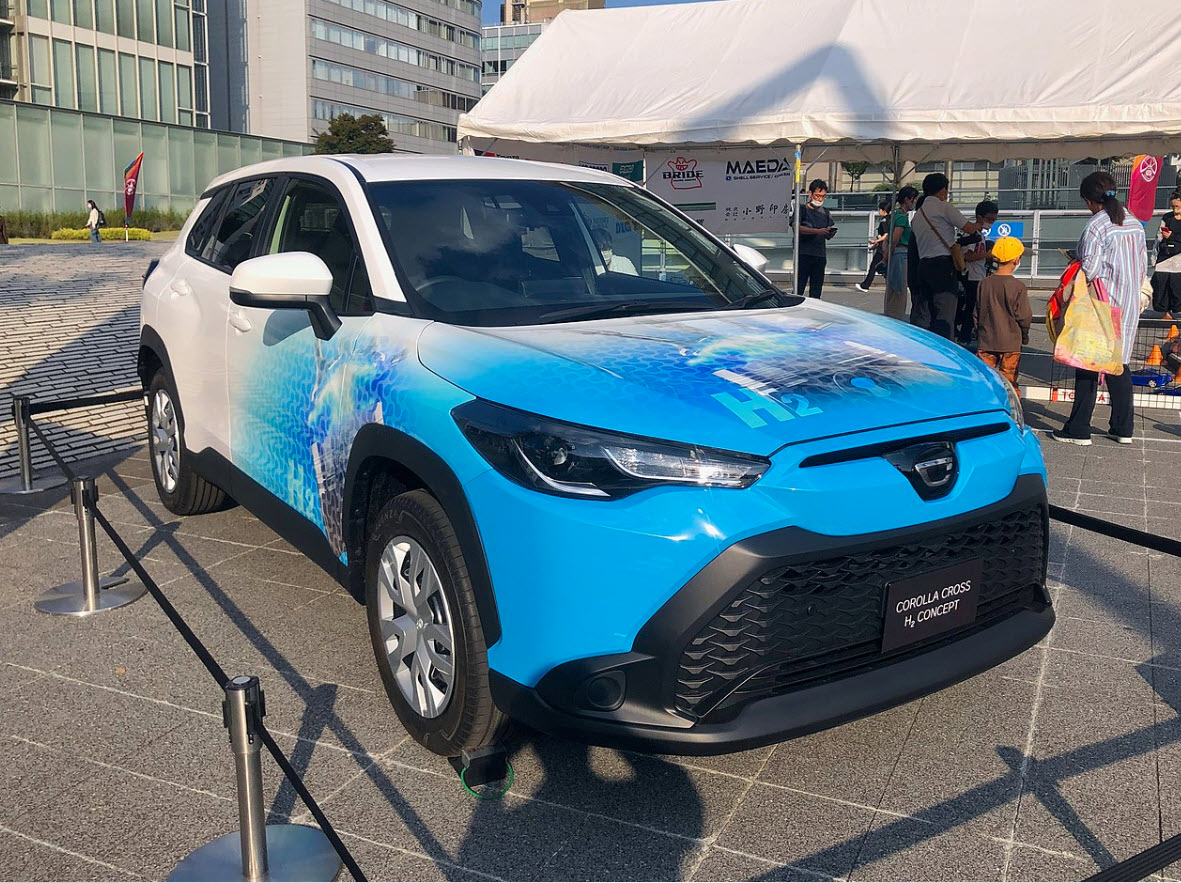
Toyota’s hydrogen combustion engine was developed out of the 1.6 liter turbocharged three-cylinder already seen in the GR Yaris and the GR Corolla. Of course, it has been altered to use H2 as its fuel. The process of this alteration included the addition of a heavy-duty fuel tank to contain the H2 under high pressure. That component was swiped from the Mirai.
Other changes made to the design include stronger connecting rods, hardened valves and valve seats, and gas (not liquid) fuel injectors. The prototype, like the standard Corolla, seats 5 people plus their luggage.
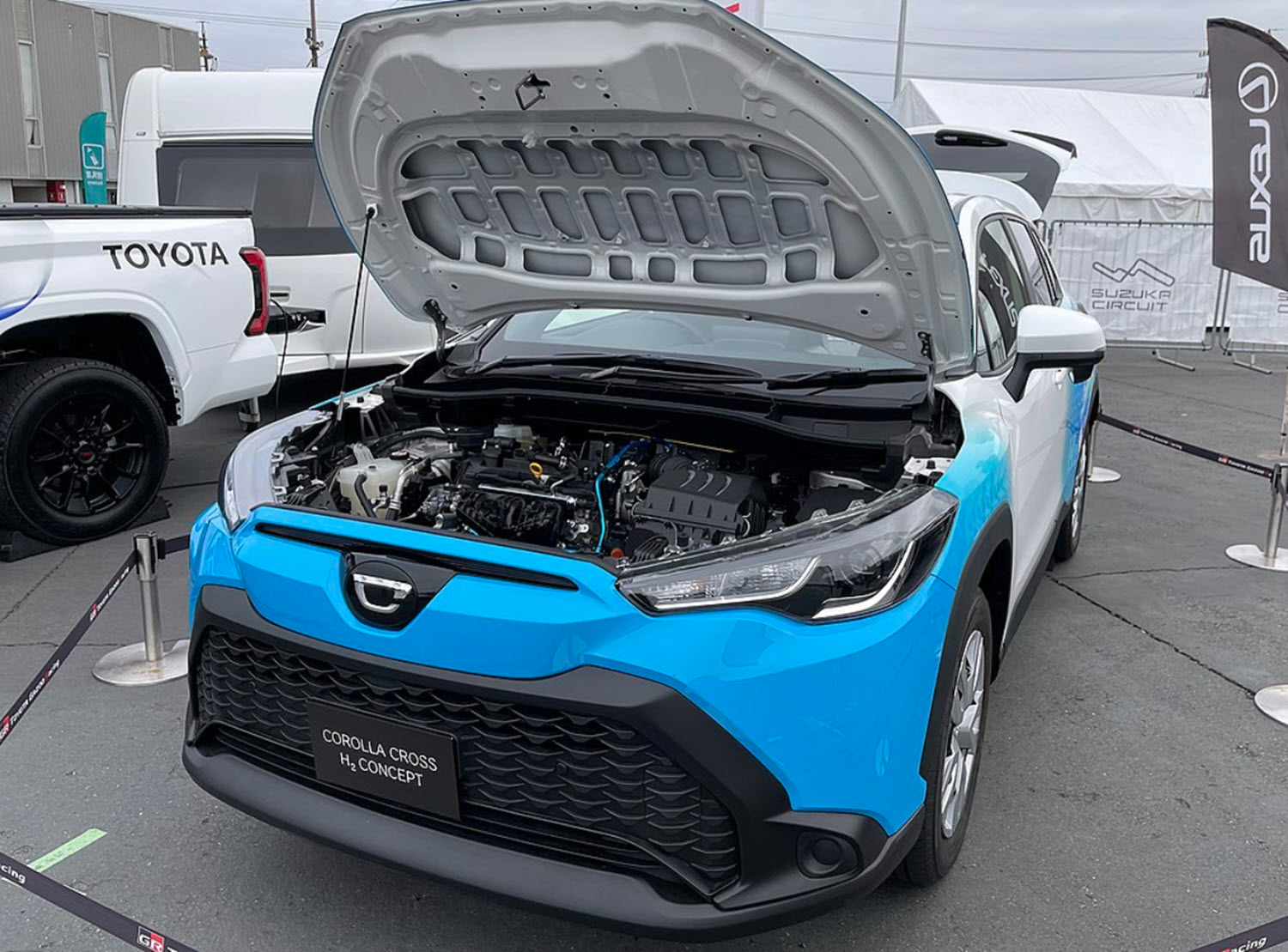
The Toyota hydrogen combustion engine offers fast refueling and requires fewer rare metals.
The Toyota hydrogen combustion engine offers a string of advantages, including those over the experience offered by EVs. Among them include the fact that this H2 ICE has a larger range and an extremely fast refueling time. In fact, the GR Yaris H2 can be refueled in only 90 seconds.
On top of those benefits to the driver, there is also an advantage to cost, material scarcity, and environmental friendliness in that it doesn’t require nearly as much rare metal such as lithium or nickel, which are critical to the manufacturing of a battery. While this vehicle does have a battery, it’s substantially smaller than an EV.
The Corolla Cross H2 concept car is now undergoing real-world evaluation. It is expected to begin winter road condition testing soon. Those tests will take place in northern Japan.
While there are already hydrogen cars both available and in development using fuel cells, hydrogen combustion engines will add a new technology option for automakers and drivers. You can also read their engine manual to learn more about how a combustion engine works. As electricity shortages grow and the price of green H2 continues to fall, many experts believe that this form of zero- and reduced-carbon emission vehicle could soon have its moment while EVs may soon hit their peak.

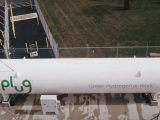

 With over 15 years of reporting hydrogen news, we are your premier source for the latest updates and insights in hydrogen and renewable energy.
With over 15 years of reporting hydrogen news, we are your premier source for the latest updates and insights in hydrogen and renewable energy.
Compared to a H2 fuel cell electric vehicle (Mirai), what are the tailpipe emissions from a hydrogen fueled internal combustion engine (H2ICE)?
No regenerative braking, not only is it a loss of energy, it means the cost of brakes.
You avoid the point that brakes are required in all vehicles.
Cars that have regenerative braking also have separate brakes as any ice vehicle does. The costs of brakes as applied on a a hydrogen combustion engine are identical to an ice vehicle, an ev and any vehicle with a regenerative system.
Not true, EVs barely use their brakes due to regenerative braking. Evs recharge and save brakes while slowing down. Evs have a term called single pedal driving due to almost never using their brakes.
ICE use brakes and fuel to slow down everytime.
And you avoid the point that brakes have to be replaced in ICE cars 4-6 times as much as in EV’s due to their lack of regen.
The brakes installed when the car is first purchased are required on both cars, and that’s where the scope around your argument ends, leaving your point hold up exclusively for cars that are bought and then never used.
Since 78% of air is Nitrogen, it will contain some NOx, but be mostly H2O. If they could use liquid O expanding to gas in a combustion chamber and not air, they could do away with all Nitrogen contamination. If using liquid O and H2 under pressure, it becomes a combustion steam engine….and no longer needs the intake or compression stroke. The condensing water exhaust will help to extract the cylinder, as 1800 cubic inches of steam collapse to 1 cubic inch of liquid water.
The best thing is, all you get from the tailpipe is…….water
This is simply incorrect. In fact, this logic is reversed, meaning the contrary is true: It is the fuel cells that produce just water, because they operate under stable temperature, while the H2 combustion engines, well, use combustion and therefore heat up. So unless you carry a tank of pure oxygen in your car, they will ignite your H2 inside the breathable atmosphere which, besides water, will most definitely produce the exact same greenhouse gasses as any other combustion engine (except of course CO2, but given that the question is about fuel cells vs. H2 combustion, I suppose we can all agree that that’s besides the point).
However, an argument could be made about the temperature at which H2 ignites being quite a bit lower than the equivalent temperature for gasoline, which could mean that at least the level NO2 produced by a H2 combustion will be lower than when producing a comparable amount of energy in a gas engine. (I am no chemist so I’m not 100% certain this is actually correct)
I understand that JCB have also decided to use hydrogen in an internal combustion engine, and not go the hydrogen fuel cell route.
There is also a lot of research going into storing hydrogen as ammonia and splitting the hydrogen away at the point of combustion
I am believe and hope that H2 is the answer to future mobility. I cannot get my head around 2 tonne family cars barreling along the highways. What happens when multi car pile-up occurs? Too scary to consider. The success of the JCB project is based on the construction industry requiring a machine to run continuously. 3 x 8hr shifts with a fuel refill and lube check at every operator change. The battery vehicle reduced the carrying capacity by 30% due to the heavy battery and recharge times reduced running time by another sinificant margin. Battery excavator did 8hrs work in 24hrs! The interview with lord Bamford was conducted in a generator room where the H2 powered genset was running! H2 significantly reduces noise from a modified diesel engine – a clear advantage. The pursuit of H2 as afuel shpuld not be limited to “green”. Pink (nuclear – derived) offers an immediate opporrunity to make the switch.
Hope Toyota’s r&d on Hydrogen combustion engines isn’t a solo run , ending in failure. The ‘silent majority’ will embrace this technology much more readily than the current range/charge-time compromised full electric (battery only) option. Bring it on!
I believe this is the best track. I’m hoping that it will also be a reasonable alternative for modifications to existing vehicles. Toyotas last long, why not modify to H2, if possible? The tailpipe comparison doesn’t have to be perfect for this alternative to be a great solution.
Quickest way to transition to clean energy, also can add regenerative cycle to make efficient. Can modify engine technology and manufacturing for existing transit industries add fueling to existing stations, utilize existing production refineries and delivery including pipelines, we all the infrastructure & inventive and production infrastructure.
That will be by using synthetic fuel, that is based on hydrogen an recaptured co2.
The problem with H2 is as always 1) range 2) flammability 3) finding a way to produce a difficult gas to produce in a clean way.
Hydrogen is so volatile that pouring liquid hydrogen on a cloth will cause instantenous combustion without a heat source. If burning EV batteries scare you, imagine exploding hydrogen cylinders in a severe accident.
Previous hydrogen powered cars had a range of about 100 – 150 miles. Technology has not advanced significantly to change that range.
Transporting an extremely volatile liquid under intense pressure is extremely dangerous, compounded with the fact you need much more of it.
Producing this gas has historically been very dirty. It can be produced cleanly but at a much higher cost.
When fully fueled with hydrogen, the 2023 Mirai XLE has an impressive manufacturer-estimated 402-mile driving range rating * and the 2023 Mirai Limited has a 357-mile driving range rating. * Driving in the city or cruising down the curvy roads, Mirai’s dynamic rear-wheel-drive platform consistently delivers an exciting, zero-emissions ride.
Boy, it sounds like you are sold on lithium battery propulsion and nothing else. Your comments concerning hydrogen powered vehicles are all negative without the positive aspects of this path towards a better way of mobility that has more range, ease of refueling, cost, weight, and more efficient with regards to changes in temperature and other environmental factors.
Hydrogen ICE requires a compression ratio of round 40:1, that is 3 times as high as normal petrol motors. How will they get them to run for 200,000km? Maybe in 10 years with ALOT of pointless research, but seriously what is the point? EVs are getting better and better by the month. This excersise is just toyota staying relavent to its conservative sales base, but you watch, Toyota will go full EV before actually build any hydrogen ICE cars to the public.
We’ll be watching to see how this plays out. Exciting advances!
I think this is all great news. We need more than one option for transportation. I was in DC about 6 years ago, and the entire city fleet were Toyota Fuel Cell powered vehicles. I keep searching to find out how well they worked out, but find zip .Any one out there know how well that went ?
amonia is the way to go
Top marks to any manufacturer of the hydrogen combustion engines within the average family motorcar cannot come soon enough for the world wide environmental sustainability! May common sense prevail to its fruition?
I have always believed in Hydrogen as the ultimate carrier of energy for transportation. If we could anesthetize H2 until combustion as in Ammonia or some other compound we’d be set.
One Key point is complexity and profitability but overall, as Mr. Toyoda mentions, it will be the consumers who ultimately decide. They pay upwards of $100K for BEVs, Tesla claims their vehicles are 4x more profitable than many other comparable vehicles.
Only time will tell.
Can we really afford the inefficient use of resources we would still see with hydrogen fuelled vehicles? Still a slave to the Carnot cycle. That requires twice as much energy on the front end as you would require to run an electric vehicle. Why no mention of this in the article?
Don’t be a BEV fanboy and use 15 year old hydrogen generation technology to discredit it against what BEV might achieve tech wise in 10 years.
Maybe they are waiting for fision.
I am one of the silent majority who would like to congratulate Toyoto on all their hydrogen work,
The elephant in the room as it seems to me is the total lack of hydrogen filling stations. Readers of this excellent magazne all know that there are many developments in this field, with states and countries all taking the fuel seriously. Would people of influence in particular in this country please lobby our blind ( other words apply) poitical classes with tihis requirement. I mean those people who keep insisting on growth whilst at the same time apparently caring for our planets future. Those people who think that we will make our fortunes leading the world in technology. whilst at the same timet falling well behind in the one technology that could power a vast amount of the green future.
There are about 50 hydrogen filling stations in the USA, most are in California. The beauty of adopting H2 as a fuel the ease by which current gas stations can add a H@ filling station to their existing facility so they can vend H2 while they continue to vend gasoline and diesel, with trailer trucks delivering H2. There is no need for massive new electrical infrastructure or charging stations being everywhere.
H2 ICE has,about half the efficiency of a fuel cell, which is not mentioned in this article. A HFC will travel twice the distance on the same amount of fuel and also releases no NOX. ICE is an inefficient use of hydrogen.
Agreed. Hydrogen advocates for car travel seem to lack an understanding of physics and energy efficiency.
Must preserve our limited quantity of precious non-renewable hydrogen. lol
One of biggest problem with an internal combustion engine, was it’s big and bulky, engine, with thousands of moving parts, lubrication problems, hefty gearboxes, etc. When the electric drive showed its head, it was a breath of fresh air, and it was a delight, to see the back of the rattling engine. Now with H2ICE, eventhough we’ve got rid of the smoke, but all those associated ICE hassles and costs are still there. I think if a H2 fuel cell electric drive, can become practical and cheap to manufacture, then fair enough, but H2ICE, looks to still have lots of old associated head aches, still coming as a package, with the car.
WT, We have all these ICE vehicles currently running around as well as digging up minerals, transporting by land, Sea and air, how long is it realistically going to take to replace all this infrastructure?
I have run NA Diesel Nissan Suv on Hydrogen additive for over 10k.
I have the Dyno reports showing increase in both HP and Torque which came in at lower Revs.
The exhaust analysis showed 49% reduction in toxins.
Plus a 29% reduction in diesel consumption.
This was a real world response on road result.
Yes. in this -10k I did need to replace the Alternator.
I am working on a new idea for creating H.
Electric motor is far more simpler to run, cheeper to produce and maintenance free. ICE together with complex gearbox is technology that needs to be left in past.
But that isn’t true of the batteries, and let’s not ignore the massive infrastructure investments needed to be able charge everyone’s EV. Choice and competition always work better than central planning or collectivism.
I I totally agree with you, Mr. James , as there are far more people, far as I know of, who are willing to pay more for an ice Powered car Over a simple electric one, simply due to the fact That there are simply more options available with ice engined vehicles, such as in race cdriving competition , fun and driving a manual transmission Vehicle and Overall Preference Among both classic car enthusiasts and current auto mechanics in the rebuilding and maintenance of ice engine vehicles! *
Well how come they are much more expensive and not a little more, A lot more expensive when they should be half the cost
This is what we need, and the world needs. It’s certainly what I’m waiting for.
Never in a million years are battery cars going to cut it. Far too many issues. Availability of resources, ethics with mining of precious metals, time it takes to recharge, charging points at home and away, the extra weight, loosing pasenger and lugguage space, mileage on a charge, the effects the cold has on battery life, end of life process…. etc etc…. as for electic HGVs, forget it.
Bring on hydrogen combustion engines ASAP
Me and classic vehicle owners want and need it